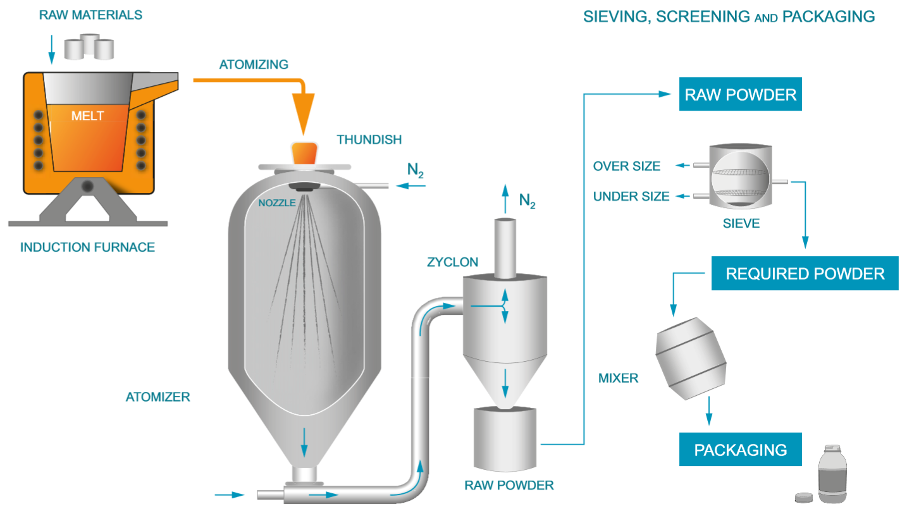Metal Powder Production - The Key to Successful 3D Printing
Daniel Kipp
Whether in aerospace, medical technology, toolmaking or the automotive industry - additive manufacturing is on the advance. In contrast to mechanical manufacturing processes such as milling, turning, etc., in additive manufacturing the component is built up layer by layer. This approach allows a high degree of freedom in the design of a part made with 3D printing. However, for these freedoms, high-quality metal powders are elementary.
DEW's know-how with metal powders is based on years of experience in the production of powders for build-up welding and thermal spraying. Therefore it was obvious to use this knowledge also for AM.
The key for successful 3D printing
DEW's powder production technology is state-of-the-art and allows an adapted powder processing according to your standards and specifications. For powder production, raw materials are melted in an induction furnace and filled in an atomizer. The atomization process takes place in a closed container in which the liquid melt is atomized under high pressure with an inert gas. In gas atomization, the solidification rate is sufficiently low so that the particles are formed in spherical shape. The spherical particles guarantee excellent flow characteristics and dosing of the powder. The cooling under inert gas ensures that the powder cools down without surface oxidation. The result is a low oxygen content in the powder. Best raw materials without impurities - all powders are controlled in our laboratory.

Figure 1: Metal powder production: Fe-, Ni- and Co-based alloys
Does a new process also need new alloys?
Overall, we can divide additive manufacturing into two areas:
- Rapid prototyping
- 3D printing of ready-to-use products
Rapid prototyping makes use of the short production times of additive manufacturing if we take the overall processing route into account. This enables the timely production of prototypes, required spare parts and components for research and development. In the area of rapid prototyping, it is essential to produce components that are identical in their mechanical properties to the later series production. The aim is to keep the steel in 3D printing identical to the steel of the later series production.
In contrast to rapid prototyping, additive manufacturing is used to create new components that can't be produced by conventional machining processes such as turning, milling, etc. In this case, the choice of material is based on the required properties of the component. Here it is appropriate and beneficial to use new alloys that have been specially developed for additive manufacturing to unfold all advantages of this technology, including adapted alloying systems. These materials are designed in such a manner to consider the processing characteristics of AM one the one hand, and on the other, enable the best properties of the printed part such as hardness, strength or corrosion resistance.
Thus, both well-known materials according to DIN standards as well new alloys are interesting for AM solutions.
Explore DEW's range of metal powders for additive manufacturing here.
Article by Deutsche Edelstahlwerke (DEW)
Deutsche Edelstahlwerke (DEW) is one of the world’s leading producers and processors of special steel long products and belongs to the Swiss Steel Group. In the three materials groups – engineering steel, tool steel and stainless, acid and heat resistant steel – Deutsche Edelstahlwerke offers international customers a uniquely wide range of product dimensions, from drawn wire with a diameter of 4.5 mm to open-die forgings with a diameter of 1,100 mm. As a partner with technical competence in steel, Deutsche Edelstahlwerke develops innovative, individual special steel solutions for complex high-tech applications and offers services ranging from steelmaking to extensive steel processing and steel finishing.
Four of the best
Deutsche Edelstahlwerke is the leading producer of long high-grade steel products. The products range from drawn wire with a diameter of 5.0 mm all the way to forged products with a diameter of 1100 mm.
This wide product range makes our offering unique in the world and gives our customers a decisive advantage: with us, they can get everything from a single source.
Tool steels
As one of the world's largest producers of tool steel, we supply exactly the steels that our customers need for their individual products, with properties accurately tailored to the respective application.

Stainless, acid and heat-resistant steels
Stainless, acid and heat-resistant steels from Deutsche Edelstahlwerke are always in demand when extreme technical requirements are imposed on the material. Because of their outstanding chemical corrosion and mechanical properties, these steel grades are particularly used in the chemical industry, mechanical engineering, the food processing industry, power engineering, medical equipment, traffic engineering and the offshore sector.

High-grade structural and anti-friction bearing steels
Automotive engineering, mechanical engineering and gearbox construction would today be almost inconceivable without high-grade structural steels and anti-friction bearing steels from Deutsche Edelstahlwerke. Made-to-measure processing and service properties are achieved by precise setting of the chemical composition and by special production and test conditions.

Special materials
Ferro-Titanit is the name of the carbide-alloyed materials of Deutsche Edelstahlwerke produced by powder metallurgy, uniting the properties of steel and cemented carbides.


